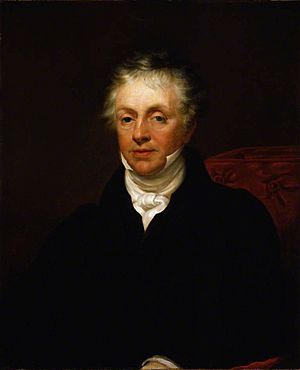Thomas Attwood (composer) facts for kids
Thomas Attwood (born November 23, 1765 – died March 24, 1838) was an English composer and organist. He wrote many pieces of music, especially for churches, and was a teacher to many young musicians.
Contents
Thomas Attwood's Early Life
Thomas Attwood was born in London, probably in an area called Pimlico. His father was also a musician who played in the royal band. When Thomas was nine years old, he became a singer in the Chapel Royal. Here, he learned a lot about music from his teachers, James Nares and Edmund Ayrton.
In 1783, a very important person, the Prince of Wales (who later became King George IV), was impressed by Thomas's skill at playing the harpsichord. The Prince decided to pay for Thomas to study music in other countries. Thomas spent two years in Naples, Italy, and then moved to Vienna, Austria. In Vienna, he became a favorite student of the famous composer Mozart.
When Thomas returned to London in 1787, he worked for a short time as a musician for the Prince of Wales.
Attwood's Musical Career
In 1796, Thomas Attwood became the organist at St Paul's Cathedral, a very important church in London. In the same year, he was also made a composer for the Chapel Royal. He continued to work closely with the royal family, teaching music to the Duchess of York and later to the Princess of Wales.
A special moment in his career was in January 1806. He played his own music, called Grand Dirge, on the organ for the funeral of Lord Nelson, a famous British hero. This was the only piece written especially for that occasion.
For the coronation of King George IV, Attwood composed a musical version of the traditional song I was Glad. This song was so popular that it was also used at the coronations of King William IV and Queen Victoria. King George IV, who had not been very supportive of Attwood for a few years, now showed him favor again. In 1821, the King made him the organist for his private chapel in Brighton.
Founding Music Societies
Attwood was also one of the first members of the Royal Philharmonic Society (RPS), which was started in 1813. This society helped promote classical music. He also helped create the Regent’s Harmonic Institution, a company that published music, in 1818.
Soon after the Royal Academy of Music was founded in 1823, Attwood was chosen to be one of its professors. He wrote another song, O Lord, Grant the King a Long Life, for the coronation of King William IV. He was working on a similar piece for the coronation of Queen Victoria when he passed away.
Thomas Attwood died at his home in Chelsea, on March 24, 1838. His funeral was held at St Paul's Cathedral on March 31, 1838. He is buried in the cathedral's crypt, right under the organ.
Attwood's Compositions
After Thomas Attwood died, his godson and student, Thomas Attwood Walmisley, collected and published many of his church songs and anthems. Today, Attwood is mostly known for a few short anthems. These include Teach me, O Lord (from 1797), O God who by the leading of a star (from 1814), Turn Thy face from my sins (from 1831), and Come, Holy Ghost (from 1834).
His music shows the influence of his teacher Mozart, but it also has the style of English church music from his early training. This mix of styles was important and influenced music throughout the 1800s. Besides his church music, Attwood also wrote songs for about twenty musical plays and comic operas between 1792 and 1807. He also wrote many glees, which are songs for several voices. One famous glee is A Rose-Bud by my Early Walk (around 1819), based on a poem by Robert Burns.
Attwood was also a teacher to several musicians, including John Goss, Cipriani Potter, his godson Thomas Attwood Walmisley, and a child music genius named Elizabeth Jonas. He also greatly encouraged the young William Sterndale Bennett through his friendship with the famous composer Mendelssohn.
Attwood's Family Life
In 1793, Thomas Attwood married Mary Denton. They had five sons and one daughter. One of his sons was a lieutenant in the Royal Engineers. Another son, George Attwood, became a church leader in Framlingham. One of his sons passed away before him in a riding accident. His fourth son managed an estate in Jamaica, and his fifth son also became a clergyman.
Thomas Attwood met the famous composer Felix Mendelssohn when Mendelssohn visited London in 1829. Mendelssohn later had an accident and injured his leg. While he was getting better, Attwood invited him to stay at his family home in Norwood. Mendelssohn even wrote a piece for harp and piano called The Evening Bell, inspired by the gate bell at Attwood's house. After staying with the Attwoods again in 1832, Mendelssohn dedicated his Three Preludes and Fugues for the Organ (Op. 37) to Thomas Attwood.
 | Jackie Robinson |
 | Jack Johnson |
 | Althea Gibson |
 | Arthur Ashe |
 | Muhammad Ali |


